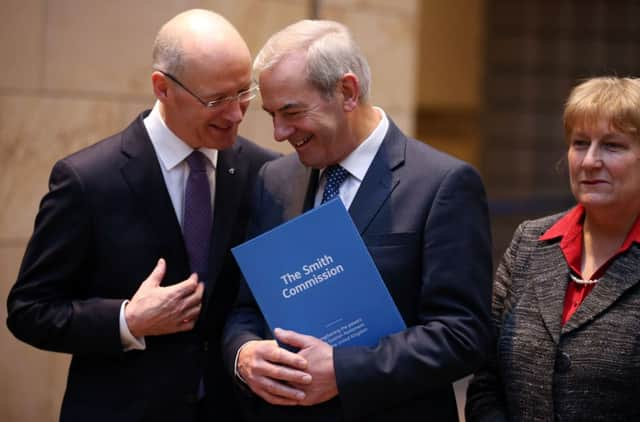Smith Commission’s best of both worlds proposals


It retains the UK infrastructure of tax collection with HMRC and employers thereby maintaining efficiency and value for money. It builds upon existing devolved authority because a Scottish rate of income tax is already in place for April 2016, whilst the Scottish Parliament will have decision-making and finance-raising responsibilities.
The measures recommended by the Smith Commission provide greater fiscal autonomy by extending the Scottish Rate of Income Tax so that in future the Scottish Parliament will have full authority over the rates and bands.
Advertisement
Hide AdAdvertisement
Hide AdSo, what do the Smith recommendations mean for Scottish taxpayers? At the simplest level, their take-home pay may change depending on the extent to which the Scottish Parliament decides to exercise its devolved powers.
Why income tax and not one of the other taxes, such as corporation tax? Income tax is by far the biggest generator of tax and is relatively predictable compared to other taxes. It may have been overshadowed lately, but legislation is already in place to deliver devolved income tax powers to Scotland from 2016, under the Scotland Act 2012. The basic and higher rates of income tax levied by the UK government in Scotland are to be reduced by 10p in the pound and the block grant from the UK to the Scottish Parliament reduced accordingly. The Scottish Parliament has the authority to set its own rate to replace this, known as the Scottish Rate of Income Tax.
CONNECT WITH THE SCOTSMAN
• Subscribe to our daily newsletter (requires registration) and get the latest news, sport and business headlines delivered to your inbox every morning
The Smith Commission recommendations will affect businesses throughout the UK. Businesses are de facto the main collection agents for government of payroll taxes. Consequently, the administrative burden on businesses will remain relatively consistent, with PAYE being the main collection tool. Any business with employees in both Scotland and the rest of the UK will have new “S” payroll codes for their Scottish taxpayers.
This means that there will be some costs associated with the necessary learning about the various changes, adaptation of business systems and reporting mechanisms, as well as the provision of support and advice to employees.
Other practical consequences will be the need to identify a Scottish taxpayer – who are they and who is responsible for their identification? In broad terms, a Scottish taxpayer is someone with their main residence in Scotland (and you may well ask about those who commute regularly between Scotland and the rest of the UK, who may need to maintain day counts of where they have been).
The proposals for devolved income tax only extend to earned income (such as a salary or self-employed income) and not investment income such as interest or dividends. This recognises that the inclusion of investment income would have imposed extra costs and complexity on banks and other deposit takers. It also recognises that for savers, personal pensions and savings need long-term stability and certainty, and full access to the unified UK savings market wherever they are in the UK.
It is helpful to retain a single UK savings and investment market and the full range of financial products, which currently offer a real and significant benefit for Scottish consumers as well as those in the rest of the UK.
Advertisement
Hide AdAdvertisement
Hide AdThe different components in the UK tax system are intricately intertwined but the devolving of income tax rates, and bands, is likely to result in different rates being applied in different parts of the UK.
This may lead to more local accountability between tax and spend. It may also influence taxpayer behaviour.
• Charlotte Barbour is head of taxation at Icas, the professional body of chartered accountants
SCOTSMAN TABLET AND IPHONE APPS